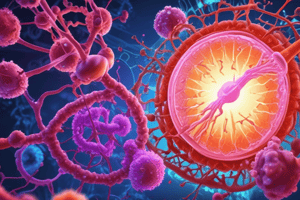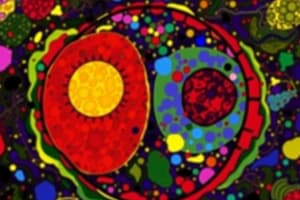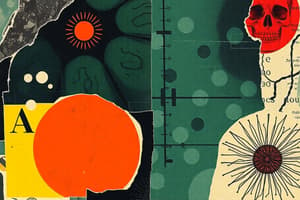Podcast
Questions and Answers
The cell cycle is independent of the activation and completion of previous phases.
The cell cycle is independent of the activation and completion of previous phases.
False (B)
If there is a deficiency in an essential gene function, the cell cycle continues uninterrupted.
If there is a deficiency in an essential gene function, the cell cycle continues uninterrupted.
False (B)
Quiescent cells are in the physiological state Go.
Quiescent cells are in the physiological state Go.
True (A)
The cell cycle does not have redundancies during the transition from G1 and S-phases.
The cell cycle does not have redundancies during the transition from G1 and S-phases.
For any quiescent cell to enter the cell cycle, there must be activation of transcriptional genes.
For any quiescent cell to enter the cell cycle, there must be activation of transcriptional genes.
The cell cycle is not involved in tissue regeneration and repair.
The cell cycle is not involved in tissue regeneration and repair.
Proto-oncogenes, when functioning normally, play no role in the regulation of cell proliferation.
Proto-oncogenes, when functioning normally, play no role in the regulation of cell proliferation.
Defective proto-oncogenes, known as oncogenes, have the potential to lead to cancer.
Defective proto-oncogenes, known as oncogenes, have the potential to lead to cancer.
Cell replication is not influenced by external growth factors or integrins in the extracellular matrix (ECM).
Cell replication is not influenced by external growth factors or integrins in the extracellular matrix (ECM).
The processes of DNA replication and cell division are tightly regulated within the cell cycle.
The processes of DNA replication and cell division are tightly regulated within the cell cycle.
In the order of cell development, differentiation occurs before proliferation.
In the order of cell development, differentiation occurs before proliferation.
Flashcards are hidden until you start studying
Study Notes
Proto-oncogenes and Cell Cycle Regulation
- Proto-oncogenes are involved in regulating normal cell proliferation
- Defects in proto-oncogenes can convert them to oncogenes, leading to cancer
- Growth factors or integrins in the ECM stimulate cell replication
Cell Cycle Overview
- The cell cycle consists of G1 (pre-synthetic), S (DNA synthesis), G2 (pre-mitotic), and M (mitotic) phases
- Each phase depends on proper activation and completion of the previous one
- The cell cycle is essential for maintaining tissue homeostasis and regulating physiologic growth processes
- It is also involved in tissue regeneration and repair
Quiescent Cells and Cell Cycle Entry
- Quiescent cells (e.g., hepatocytes) can enter the cell cycle from G0 to G1
- Quiescent cells are in a physiologic state (G0) and can occasionally enter the cell cycle
- For quiescent cells to enter the cell cycle, transcriptional genes, including proto-oncogenes and genes needed for ribosome synthesis and protein translation, must be activated
Cell Cycle Controls and Redundancies
- The cell cycle has multiple controls and redundancies, especially during the transition from G1 to S phases
- Essential gene function defects can stop the cell cycle
Studying That Suits You
Use AI to generate personalized quizzes and flashcards to suit your learning preferences.




